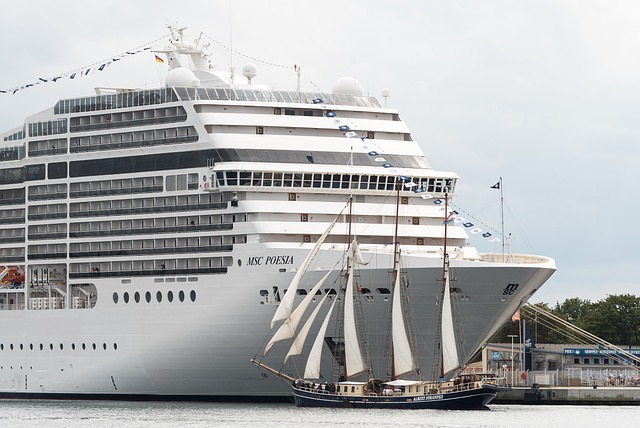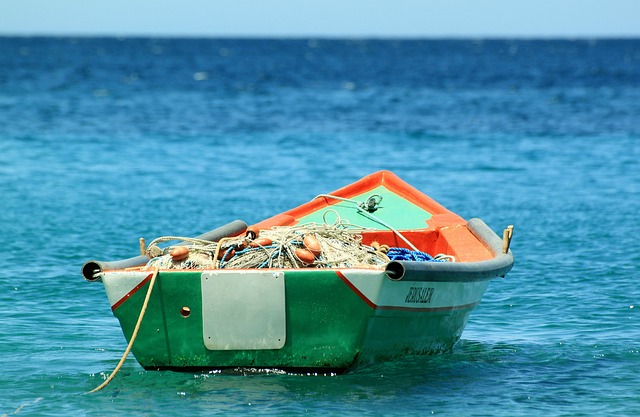Eco-Savvy Boating: Navigating to Sustainable Seas with Innovative Battery Technologies
The maritime industry is increasingly embracing sustainable boat battery technologies to reduce environmental impact and comply with stricter regulations. Advanced lead-acid batteries now offer longer life spans and better efficiency with less toxicity. Lithium-ion boat batteries are becoming more …….

The maritime industry is increasingly embracing sustainable boat battery technologies to reduce environmental impact and comply with stricter regulations. Advanced lead-acid batteries now offer longer life spans and better efficiency with less toxicity. Lithium-ion boat batteries are becoming more popular due to their lightweight, compact design, longer lifespans, and faster charging capabilities, which support eco-conscious boating and offer a cost-effective solution for recreational and commercial users alike. The integration of solar panels with boat batteries amplifies these benefits by providing an additional renewable energy source that decreases reliance on fossil fuels, cuts carbon emissions, and promotes cleaner maritime activities. The evolution of the marine battery sector is aligning with a global shift towards sustainability, ensuring that modern vessels can operate efficiently while safeguarding the health of our oceans.
Embark on a greener voyage with our exploration of eco-friendly battery innovations in maritime applications. This article illuminates the transformative role of boat batteries in sustainable navigation, scrutinizes the environmental footprint left by traditional marine batteries, and champions eco-conscious alternatives. Delve into cutting-edge lithium-ion technology and its significance for today’s conscientious boaters. Furthermore, we’ll address the imperative of recycling and proper disposal methods for old batteries. From advanced lead acid batteries to solar power solutions, learn how to harness clean energy for your vessel. Anticipate future trends that promise to further diminish the marine industry’s ecological impact. Join us as we navigate the waves of battery evolution for a cleaner tomorrow.
- Understanding the Role of Boat Batteries in Sustainable Navigation
- The Environmental Impact of Traditional Marine Batteries
- Eco-Friendly Alternatives to Conventional Boat Batteries
- Lithium-Ion Technology: A Game-Changer for Eco-Conscious Boaters
- The Importance of Recycling and Proper Disposal of Old Boat Batteries
- Advanced Lead Acid Batteries: An Overview
- Solar Power for Boats: Harnessing the Sun for Sustainable Energy
- Future Trends in Eco-Friendly Marine Battery Innovations
Understanding the Role of Boat Batteries in Sustainable Navigation

As the maritime industry seeks to align with environmental sustainability, the role of boat batteries in sustainable navigation has become increasingly pivotal. Traditional lead-acid batteries have long been the standard for powering marine vessels, but they are being phased out due to their toxic nature and lower energy efficiency when compared to modern alternatives. Eco-friendly battery innovations, such as lithium-ion and advanced AGM (Absorbed Glass Mat) batteries, offer a cleaner and more efficient solution. These batteries not only provide longer service life but also reduce the environmental footprint of boats significantly. They are designed to handle the demanding conditions at sea, ensuring that vessels can operate with minimal impact on marine ecosystems. The transition to these eco-friendly boat batteries is part of a broader shift towards sustainable practices in navigation, which includes optimizing energy use, reducing emissions, and protecting biodiversity.
The integration of eco-friendly boat batteries into the maritime sector is not just about replacing old technology; it’s a step towards a greener future for oceans and waterways worldwide. These new battery systems are more energy-dense, meaning they store more power in less space, which is crucial for extending the range of electric boats and hybrids. Moreover, they are rechargeable, offering a renewable energy source that can be powered by solar panels or shore connections without the need for fossil fuels. As regulatory bodies impose stricter environmental standards, the adoption of these batteries becomes not just an eco-conscious choice but a necessity for compliance and long-term viability in the boating industry. Embracing these innovations is essential for maintaining the health of aquatic environments while still enjoying the myriad benefits of maritime activities.
The Environmental Impact of Traditional Marine Batteries

Traditional marine batteries, often lead-acid models, have long been the mainstay for powering vessels and their onboard systems. However, these batteries come with significant environmental implications. The production of lead-based batteries is resource-intensive, involving the mining and processing of sulfuric acid, antimony, and other materials. This process not only depletes natural resources but also generates a considerable amount of waste and greenhouse gas emissions. Moreover, when these batteries reach the end of their lifecycle, proper disposal is critical to prevent environmental contamination from the toxic substances they contain. Lead and sulfuric acid can leach into soil and waterways, posing risks to aquatic life and potentially affecting human health through the food chain. The environmental impact of traditional marine batteries underscores the urgency for innovation in this sector, highlighting the need for greener alternatives such as lithium-ion boat batteries that offer longer lifespans, lower maintenance requirements, and reduced environmental footprints.
Eco-Friendly Alternatives to Conventional Boat Batteries

Navigating the shift towards more sustainable practices, eco-friendly alternatives to conventional boat batteries are becoming increasingly prevalent. These green options offer a significant reduction in environmental impact compared to traditional lead-acid batteries. One of the most promising eco-friendly choices is lithium-ion technology, which provides higher energy density, longer lifespans, and improved performance without the hazardous materials associated with conventional batteries. Lithium-ion batteries are also lighter, contributing to better fuel efficiency for the boat and reducing the carbon footprint overall. Moreover, they offer a more consistent power supply, crucial for the reliable operation of onboard electronics and electrical systems.
Another eco-conscious option in the realm of marine battery technology is sodium-sulfur batteries. These batteries are not only efficient but also have a lower environmental impact during their manufacturing and disposal processes. They can store large amounts of energy, which is beneficial for electric or hybrid boats that require substantial power reserves. Additionally, advancements in solar-powered battery systems integrate photovoltaic cells that charge the batteries while at sea, further minimizing the ecological footprint of boating activities. As the maritime industry moves towards greener practices, these eco-friendly boat battery innovations are set to play a pivotal role in preserving our aquatic environments.
Lithium-Ion Technology: A Game-Changer for Eco-Conscious Boaters

Lithium-ion technology has revolutionized the way eco-conscious boaters power their vessels, offering a sustainable and efficient alternative to traditional lead-acid batteries. These advanced boat batteries provide remarkable energy density, which means they can store more power in a smaller and lighter package compared to their predecessors. This enhancement is particularly beneficial for maritime applications, where space and weight are at a premium. Lithium-ion batteries also boast longer lifespans and more consistent performance, reducing the environmental impact associated with frequent battery replacements and disposal. Additionally, they offer a faster charge rate, which is crucial for recreational boaters who require reliable power for onboard electronics, from fish finders to GPS systems. The eco-friendly nature of lithium-ion boat batteries is further highlighted by their reduced self-discharge rate, meaning they retain their charge for extended periods without the need for frequent recharging. As a result, these modern batteries are not only kinder to the environment but also provide a more user-friendly and efficient solution for power needs on the water. Boaters looking to minimize their carbon footprint and invest in long-term savings should seriously consider upgrading to lithium-ion boat batteries, a game-changer for those who prioritize sustainability without compromising on performance.
The Importance of Recycling and Proper Disposal of Old Boat Batteries

The environmental impact of marine batteries cannot be overstated, given their heavy metals content which can leach into water systems and disrupt aquatic ecosystems. Recycling old boat batteries is a critical step in mitigating this risk. It ensures that the lead, acid, and other components are properly processed to prevent pollution. By participating in battery recycling programs, boat owners contribute to the conservation of marine life and the preservation of water quality. These programs repurpose or break down batteries, extracting metals for use in new products and reducing the need for virgin materials. Proper disposal is equally important; it involves adhering to local regulations and guidelines, which typically require taking old batteries to designated recycling centers. This responsible approach not only protects the environment but also sets a precedent for sustainable practices within the boating community. It’s a proactive measure that aligns with the broader goal of promoting eco-friendly innovation across all sectors, including maritime activities. As such, boat owners are encouraged to be mindful of their battery’s end-of-life and to take initiative in recycling and proper disposal, thereby supporting the shift towards a more sustainable future.
Advanced Lead Acid Batteries: An Overview

Advanced lead acid batteries represent a significant evolution in energy storage technology, offering a sustainable and cost-effective alternative to traditional battery systems. While commonly associated with starting, lighting, and ignition (SLI) applications in vehicles, these batteries have found a particularly valuable application in marine settings due to their durability and high tolerance for harsh environments. Boat batteries, specifically, are designed to meet the unique demands of boating, providing reliable power for both start-up and deep-cycle applications. The lead acid battery’s ability to withstand frequent charge and discharge cycles makes it an ideal choice for marine use where solar or generator charging is often the primary energy source. These batteries are engineered with a robust construction and long lifespan, ensuring consistent performance on the water. Additionally, advancements in lead acid technology have led to improved efficiency and reduced environmental impact, making them an eco-friendly option for those looking to minimize their carbon footprint. The ongoing innovation in this field not only enhances the battery’s longevity but also its compatibility with renewable energy sources, further solidifying its role in the transition towards greener technologies.
Solar Power for Boats: Harnessing the Sun for Sustainable Energy

In recent years, the integration of solar power into marine environments has gained significant traction, offering a sustainable and eco-friendly solution for boat owners. The use of boat batteries, specifically those designed to store solar energy, is a pivotal shift from traditional fossil fuel-based systems. These advanced batteries not only reduce the carbon footprint associated with boating but also offer a renewable power source that aligns with environmental conservation efforts. By installing solar panels on board, boats can harness the abundant energy of the sun, thereby extending their operational range without the need for frequent recharging at docks. This innovation is particularly beneficial for offshore adventurers and those who wish to minimize their environmental impact while enjoying the waters. The seamless integration of these solar-powered systems into existing boat batteries can power various onboard appliances, from navigation equipment to refrigeration units, ensuring a comfortable and sustainable experience on the water.
Furthermore, the adoption of solar boat batteries is not only environmentally conscious but also economically viable in the long term. The initial investment in solar panels and compatible battery systems can lead to significant savings over time, as boat owners can reduce their reliance on traditional fuels and associated costs. Moreover, the reliability of these systems means that users can depend on a consistent power supply, which is critical for safety and navigation. As eco-consciousness continues to rise among the boating community, the demand for solar boat battery solutions is expected to grow, driving further innovation and efficiency in this green technology sector.
Future Trends in Eco-Friendly Marine Battery Innovations

As the maritime industry continues its shift towards sustainability, the demand for eco-friendly marine batteries is on the rise. Future trends in this sector are focused on enhancing the performance and lifespan of boat batteries while minimizing their environmental impact. Innovations such as advanced lead-acid technologies with reduced toxicity and the development of lithium-ion alternatives are paving the way for greener options on watercraft. Researchers are also exploring the potential of sodium-sulfur and vanadium flow batteries, which offer high energy densities and are more recyclable than traditional marine batteries. The integration of renewable energy sources, like solar panels, into the battery systems is another trend that promises to significantly cut down reliance on fossil fuels and reduce emissions from boats. These developments not only contribute to cleaner oceans but also provide boat owners with longer-lasting and more efficient power solutions, ensuring that vessels can navigate the seas without compromising environmental integrity. The marine battery industry is poised to become a leader in eco-innovation, driven by stringent regulations and a growing consciousness among consumers about the importance of preserving our planet’s ecosystems.
In conclusion, the shift towards eco-friendly boat batteries represents a significant stride in sustainable navigation practices. As highlighted throughout this article, traditional marine batteries pose environmental risks that underscore the urgency for greener alternatives. Lithium-ion technology stands out as a transformative solution for eco-conscious boaters, offering high efficiency and reduced ecological footprints. The responsible recycling and proper disposal of old batteries are critical to maintaining this progress. Advanced lead acid batteries also play a role in this transition, providing a stepping stone towards more sustainable options. Solar power emerges as a promising renewable energy source for boats, harnessing the abundant sun for clean energy needs. Looking ahead, the trajectory of marine battery innovation points towards even more eco-friendly advancements. Embracing these innovations is not just an environmental imperative but also a responsible choice for the future of our oceans and waterways.







